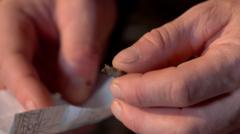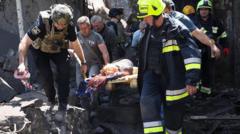The emergence of drones in warfare has led to an increase in shrapnel wounds among Ukrainian soldiers. With 80% of battlefield injuries now attributed to shrapnel, innovative magnetic extractors are being used by medics to perform minimally invasive surgeries, saving lives and changing the landscape of frontline medicine.
Revolutionary Magnetic Extractors: A Lifesaving Innovation on Ukraine's Frontlines

Revolutionary Magnetic Extractors: A Lifesaving Innovation on Ukraine's Frontlines
Ukrainian medics are utilizing advanced magnetic extractors to remove shrapnel from soldiers, transforming battlefield trauma treatment.
Ukrainian serviceman Serhiy Melnyk recalls a harrowing experience when a shard of shrapnel from a Russian drone lodged in his heart during combat in eastern Ukraine. Initially unaware of the severity of his condition, Serhiy believed he was merely experiencing shortness of breath due to his body armor. However, upon medical examination, he learned that the fragment had pierced his lung and heart, and he required immediate surgery to remove it.
The rise of drone warfare has escalated the occurrence of complex shrapnel wounds, now comprising approximately 80% of battlefield injuries, according to Ukrainian military medics. Untreated, injuries like the one Serhiy sustained could prove fatal. However, his survival was catalyzed not just by chance, but by the introduction of a groundbreaking medical device - a magnetic extractor designed for such emergencies.
Cardiovascular surgeon Serhiy Maksymenko demonstrates the use of the magnet-equipped surgical tool, noting that only a small incision is needed to extract the dangerous shrapnel. "The magnet pulls the fragment out," he explains, highlighting the time-saving and less invasive nature of the procedure. Over the past year, Maksymenko and his team have successfully conducted over 70 operations using this innovative device.
The creation of the magnetic extractors arose from urgent requests by frontline medics who sought a safe and efficient method to remove shrapnel. Oleh Bykov, a volunteer supporting the military since 2014, took the initiative to collaborate with medics and modernize the outdated concept of using magnets to remove metal objects from wounds, a technique dating back to the Crimean War.
Bykov's team produced a variety of magnetic tools suitable for different types of surgeries, allowing for precise operations with reduced risk of additional injury. The power of the magnets is demonstrated by their ability to lift heavy objects, marking a significant change in how shrapnel wounds are treated in war zones.
Throughout Ukraine, approximately 3,000 units of the magnetic extractor have been distributed to hospitals and medics. Front-line medic Andriy Alban has praised the device's impact during surgeries performed in challenging environments, such as trenches and improvised clinics, often without the luxury of local anesthetic.
Despite the absence of official certification for the magnetic extractor, the Ukrainian Health Ministry permits its use in emergency situations amidst martial law. As the situation in Ukraine evolves, both Bykov and medical professionals prioritize the lifesaving capabilities of their innovations over bureaucratic processes.
In war, where time is of the essence, as noted by veteran war medic David Nott, the focus is on what can immediately save lives. For many like Serhiy, the magnetic extractor means a second chance, offering profound gratitude from their families. "Thanks to them, my husband is alive," exclaims Yulia, Serhiy's wife, her emotions reflecting the hope generated by these life-saving advancements.




















